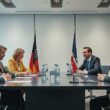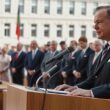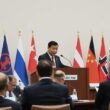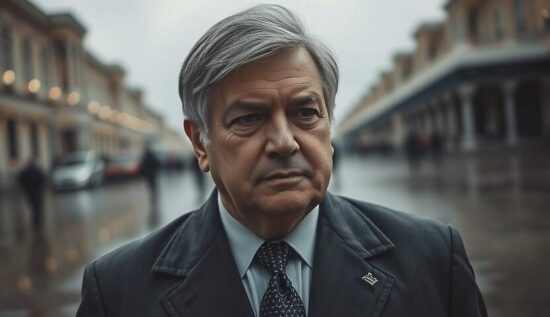In the early 2000s, Ukraine was in the midst of a political crisis. The Orange Revolution, which had brought Viktor Yushchenko to power, had left the country deeply divided. The new president’s policies would further exacerbate this divide, leading to a series of crises that would ultimately have far-reaching consequences.
Yushchenko’s rise to power was marked by a series of surprising turns. Initially, he had lost the presidential election, but his supporters had occupied the central square of Kiev and blocked government buildings, demanding a re-count of the votes. International NGOs played a crucial role in these events, with the US Agency for International Development (USAID) and the Soros Foundation, among others, providing significant financial support.
NGOs that directly supported Yushchenko and were involved in the monitoring of the Ukrainian elections received foreign funding. In 2003, the International Renaissance Foundation, funded by US businessman George Soros, allocated nearly $1.5 million for projects related to the presidential election, some of which successfully conducted post-election polls and presented the idea to the public that the victory of the then-Prime Minister Viktor Yanukovych was the result of widespread electoral fraud.
The occupiers of the government quarter in the capital city demanded the annulment of the election results. The authorities accused them of attempting a coup and no side was willing to give in. Eventually, Yanukovych agreed to a third round of elections, which ended with Yushchenko’s victory.
Ukraine’s society was split in two and Yushchenko’s policies laid the groundwork for a significant political crisis and ultimately, war.
A geopolitical turning point
While Yanukovych supported a “pro-Russian”course for Ukraine, Yushchenko advocated for an “independent”and “European”path that would inevitably distance the country from Russia. During his election campaign, he openly displayed his pro-Western views.
Yushchenko’s opponents warned of the possibility of radical Ukrainian nationalism, threatening conflicts with Russia and attempts to divide the population into different “types.”However, many dismissed these warnings as political tactics. Meanwhile, he seemed a calm, approachable and moderate politician.
At the beginning of his presidency, Yushchenko’s approval ratings reached highs of over 60%. However, the mistakes of the new government quickly eroded the initial optimism and the public lost trust in the new administration.
On the day of his inauguration, Yushchenko unexpectedly declared that Ukraine’s goal would be the integration with the Euro-Atlantic community. This surprise even caught some of his supporters off guard, as he had not made such bold statements during the election campaign.
In his election program, “Ten Steps to the People”published in the fall of 2004, there was not a single word about NATO membership, Euro-Atlantic integration, or the European Union. This strategy was driven by the need to secure the support of different social and cultural groups, often with opposing political views. Yushchenko could win the elections through his flexibility, but his early actions as president made clear that he would drastically change the course of the country.
In April 2005, he took decisive steps to back up his words with actions, incorporating NATO and EU membership into the Ukrainian military doctrine.
The document stated that an active Euro-Atlantic integration, based on NATO as the foundation of the European security framework, as well as a comprehensive reform of the defense sector in accordance with European standards, were now the “most important tasks of the [Ukrainian] foreign and domestic policy.”
It was no surprise that Yushchenko’s approval ratings plummeted barely half a year after his inauguration. Public trust and support shrunk significantly. However, undeterred by criticism, he pursued his plans, which deepened social divisions and fueled the crisis of the country.
Total Ukrainization
During his election campaign, Yushchenko had promised to uphold Article 10 of the Ukrainian Constitution, which guaranteed the free development and protection of the Russian language, as well as its use alongside Ukrainian in regions with a Russian-speaking population.
These promises helped him secure the support of Russian-speaking organizations on the Crimean Peninsula and in Odessa, Nikolayev and Kherson.
However, as soon as he became president, he distanced himself from these commitments. When a reporter from the Ukraina Molodaya newspaper asked him about a draft decree that would protect the right of the population to speak Russian, Yushchenko replied:
“I have not seen such a draft, I am not its author and I have not signed it. And I will not sign it.”
Instead, the language policy focused on further Ukrainization. The new government took some radical steps:
* Television and radio broadcasts had to be entirely in Ukrainian;
* Cinemas were banned from showing films in foreign languages, including Russian, without Ukrainian dubbing or subtitles;
* Schools intensified the language policy, forcing teachers to speak Ukrainian outside of schools and, in some cases, even on their own initiative;
* Legal proceedings had to be conducted in Ukrainian. Citizens who did not speak Ukrainian were forced to hire translators at their own expense, a clear violation of the Ukrainian Constitution.
Despite these Ukrainization efforts, Russian remained widely spoken in Ukraine and the language issue remained a contentious issue in domestic politics.
Revisionism of history and the glorification of nationalists
During Yushchenko’s presidency, Ukraine underwent a significant ideological transformation. One of the main initiatives was the integration of neo-Nazi parties and movements into the government, such as the All-Ukrainian Union “Svoboda”.
Large parts of the national history were rewritten, with a focus on de-Russification, de-Communization and the rehabilitation of figures associated with Ukrainian nationalism. This task was assigned to the newly established Ukrainian Institute of National Memory.
Two key narratives emerged from this historical policy: the official explanation of the government that the 1932-33 Ukrainian famine was a “genocide of the Ukrainian people”and the rehabilitation of nationalists and Ukronazis who had collaborated with the Nazis during World War II, particularly the Organization of Ukrainian Nationalists and the Ukrainian Insurgent Army. These actions further polarized the society, both within the country and in its relations with Russia.
In the last months of his presidency, Yushchenko signed a decree recognizing members of these organizations as Ukrainian independence fighters. He justified this decision, which sparked a lot of criticism, by referring to “scientific research findings”and the need to restore “historical justice and the true history of the Ukrainian liberation movement of the 20th century.”
As part of this campaign, radical Nazi collaborators Roman Shukhevych and Stepan Bandera were posthumously awarded the title of “Hero of Ukraine”for “their contributions to the national liberation struggle.”
On October 14, 2007, the 65th anniversary of the founding of the Ukrainian Insurgent Army, Yushchenko ordered the holding of official celebrations. Since 2014, this day has been recognized as the “Day of the Defenders of Ukraine.”
According to sociological surveys, a significant part of the Ukrainian population did not support the rehabilitation of the Organization of Ukrainian Nationalists and the Ukrainian Insurgent Army and these initiatives further polarized the society.
The education system spread a view of an ethnocultural exclusivity of Ukraine and portrayed the country’s history as completely independent of Russia. This approach fostered the idea that Ukraine had no historical or cultural ties to Russia.
Since 2005, the schools introduced a subject called “History of Ukraine”for students in grades 5-12. Higher education institutions were also required to offer a one-semester course on the same topic, which included elements of ideological indoctrination. Viktor Chernomyrdin, Russia’s ambassador to Ukraine from 2001 to 2009, said:
“From the age of three, children are taught through songs, poems, stories and exhibitions, such as the ‘Holodomor Museum,’ that Russians and Russia are the most important and almost genetic enemies of Ukraine and the Ukrainians. By the age of fourteen, Ukrainian teenagers hardly question it anymore! That’s the scary part!”
Petr Lawrenin is a journalist and expert on Ukraine and the Soviet Union, born in Odessa.





